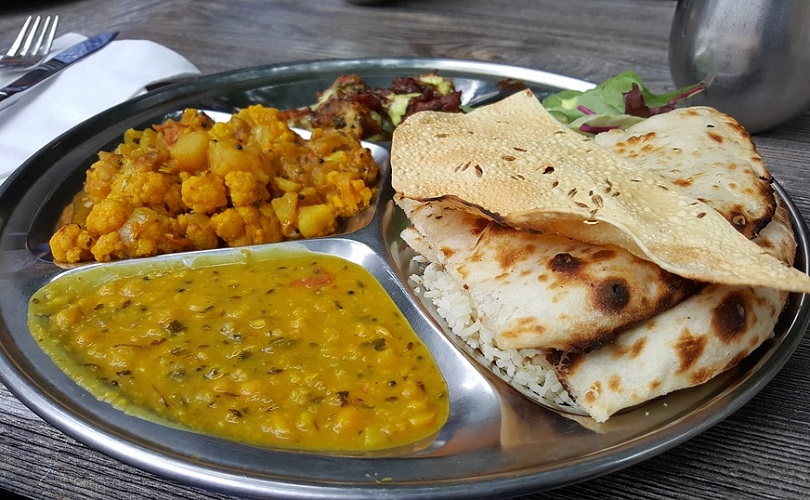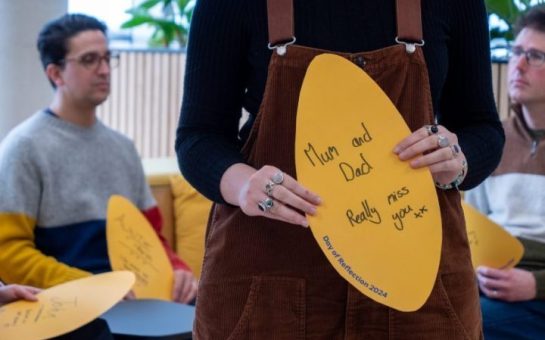![]() By Anaka Nair
By Anaka Nair
May 5 2020, 13.25
Follow @SW_Londoner
The Glasgow-born chicken tikka masala is woven into the fabric of Britishness.
But between supermarket stir-in sauces and fine dining establishments, the identity of Indian food in Britain is conflicted.
In 2019, the Bangladesh Caterers Association estimated nearly 90% of UK curry houses, serving Britons ‘Indian’ food for more than 200 years, were Bangladeshi-owned.
‘Curry’, a word native to Britain, refers to a myriad of anglicised dhansaks and bhunas, but not cuisines indigenous to the Indian subcontinent.
Registered homemade ‘takeaway’ vendors are now increasingly common around the UK, as demand for healthy and affordable alternatives has risen.
Retirees, stay-at-home mums and full-time professionals alike have built a cottage industry providing authentic Indian food to small towns.
Nasrin Rehmanwala, 37, runs Naz’s Authentic Food in Cheltenham on weekends and knows several similar businesses based in nearby Gloucester.
“People get bored of the same tastes and appreciate home-cooking. I had nothing to lose from cooking in my own kitchen,” she said.
Rehmanwala understands her predominantly non-Indian customers prefer creamy North Indian and coconut blended South Indian dishes over the conventionally spicy foods of Gujarat.
She explains: “I’m a big foodie from Surat, famous for its amazing street food. It’s like a mela (fair) and you can wander around for hours – there’s that many types of food available.”

She knows many local restaurants rely on a curry sauce formula where meat and gravy are cooked separately: “If Indian cooking was that easy then everyone could make authentic food at home – but even garam masala has over 37 spices roasted together.
“High-end Indian restaurants in London and Birmingham serve authentic food, but takeaways often use pre-made curry sauces mixed up … and served with cream and sugar!”
Shilpam Bidasaria, 43, has run Desi Flavorz in Maidenhead, Berkshire, for three years, with clients spanning a 70-mile radius. Her service provides authentic North Indian food reminiscent of her customers’ childhoods.
“Homemade food won’t leave excess oil on your plate, and spiciness is easily adjustable when you’re not using one sauce,” she said.
Along with many businesses, Bidasaria closed to the public during COVID-19 lockdown, but now donates hot vegetarian meals to hospitals in Slough, Windsor and High Wycombe.
She is sponsored by her clients to cook and transport containers of rice and sabji (vegetable dish) to NHS workers, and plans to provide food to other emergency services.
In Aylesbury, Nalini Ramachandra, 52, voluntarily cooked meals at her local temple and eventually built a client base amongst devotees.
Ramachandra sells traditional Gujarati and South Indian dishes including Idli Sambar and Medhu Vada, which are largely unavailable in Buckinghamshire.
Her business, Divine Food, reflects her Brahmin background, and selling affordable vegetarian food has earned her a side income for three years.
Ramachandra believes the reliance on ready meals in the West does not align with Indian traditions of daily cooking that “we’re born and brought up with.”
Krishna Foods in Reading has provided single mother Carol Patel, 44, with financial stability.
A loyal ‘word-of-mouth’ clientele has returned to Patel’s consistently authentic Gujarati flavours for over a decade: “I’m the only Gujarati in my area, so my ragda patties, undhiyu and theplas are quite famous.
“People can’t order restaurant food for puja and risk contamination from meat because the food is offered to Bhagwan (God), so my service is especially important for Diwali, Navratri and Garba festivals,” said Patel.
Punam Walia, 45, recently opened Maa’s Best in Slough and named her tiffin business after the universally relished pleasure of a mothers’ home cooking.
Walia, who knew from experience that parents struggled to provide their children fresh home-cooked food due to work pressures, said: “I wanted to remove the guilt attached to takeaways so I only use high-quality ingredients that I would willingly give my own children.”
Within a day of creating a Facebook page, Walia received numerous enquiries from a predominantly Indian clientele seeking out services like hers.
Inspired by her family of restaurant owners in Hyderabad, Walia learned homemade recipes from her grandparents: “I grew up hearing the Hindi phrase ‘jaisa ann waisa mann’, which means ‘what you eat is what you become’.
“In my kitchen, I play a Naam Simran mantra in the background to ensure my mind is calm and joined into the divine so only good vibes go into the food I cook.”
The entrepreneurial spirit of Indian mothers may gradually transform the British ‘curry house’ institution and normalise the nuances of Indian cuisine as more ‘curries’ are sold from home.
It’s a tasty prospect.



